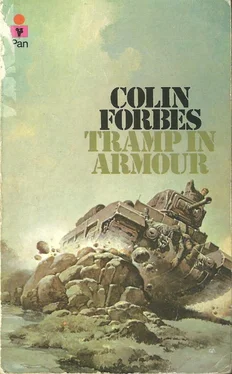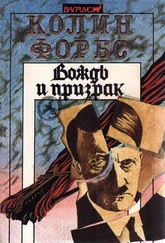‘Good of them to send up a smoke signal.’
* * *
Lieutenant Jean Durand of the 14th French Chasseurs found it difficult to believe his eyes as he focused his glasses across the flooded zone. His unit was charged with the defence of this forward sector of the Dunkirk perimeter and so far it had been a quiet morning, but then this is what he had expected because how could Panzers advance across water? And, Durand asked himself, how can this idiot advance across water? Speaking into the field telephone, he asked the British liaison officer to come at once. This was a sight which must be shared.
The lone figure on the bicycle was crouched low over his machine as though he could hardly stay on it, but still he cycled steadily across the sheet of water, never once looking up, as though he knew the way by heart. Barnes had to ride in that fashion because it was the only way he could see the road surface under six inches of water. His pedalling motion had long since become mechanical, a movement which had no relation to thought. In fact, he had now reached the stage where he hadn’t looked up for some time and he had no idea he was so close to the Allied lines.
The British liaison officer, Lieutenant Miller, had now joined his colleague and his eyes narrowed behind the field-glasses as he recognized the uniform. Apart from the fact that the cyclist could cross water, this sudden arrival of another apparition was not a complete surprise to Miller because in the present state of the battlefield men kept stumbling into the perimeter with increasing frequency. A dog’s breakfast, that’s what it is, Miller told himself. All over the bloody shop.
The cyclist was within a hundred yards of where they stood when there was almost a disaster. Unknown to either Durand or Miller, because they had been unaware of the road’s existence, and unknown to Barnes because he hadn’t been this way before, the road suddenly dipped and before he knew what was happening he was cycling up to his chest in water, and then he fell off. They dragged him out spluttering and choking, holding him up between them until they reached dry land where they laid him out on the grass. Barnes was desperately trying to say something and in spite of Miller’s attempt to restrain him he burst out with it.
‘Road goes all the way… all the way to Lemont… Jerry Panzers.’
‘Got it,’ said Miller. ‘Not to worry. Hospital for you, my lad.’
Barnes spent two days at the Dunkirk field station for the seriously wounded although he kept trying to tell them that he was only seriously exhausted. In spite of his efforts to leave they refused to listen to him, so he waited his opportunity until the ward was empty of staff and then he crept out behind the hospital still in his pyjamas, his bundle of clothes under his arm. It took him half an hour to dress himself behind the hanging wall of a bombed house, and when he reached the beaches he made a tremendous effort to walk upright as though there were nothing wrong with him. He was still only vaguely aware that a total evacuation was taking place and he was frightened that they might not take him if he didn’t look fit.
Afterwards he could only recall the journey as a blur, like a film run too quickly through the projector. The endless wait on the beaches, the sand coughing up as bombs fell, the crowded boat which threatened to sink under the great weight of men who sat shoulder to shoulder, the incredible calm of the Channel as they crossed to England under bombardment and in a blaze of sunshine. Then Dover. Dover was the same thing all over again. A tremendous muddle, hundreds of men moving off in trains with hardly any supervision so far as he could see.
He waited alone for long hours, searching the sea of faces so intently that eventually he feared he was incapable of seeing what he was looking for. Twice he had persuaded a military policeman to let him wait a little longer and he was on the point of giving up when his heart jumped. Three soldiers were helping a fourth along the platform to a waiting train and he recognized the stoop of the broad shoulders, the tilt of the head of the limping man who was being helped. Reynolds! He could hardly believe it as he ran forward and when the three men saw his stripes they left the driver in his care and wearily climbed aboard the train. Reynolds managed a faint grin, leaning on his stick.
‘Those three Jocks found me outside Lemont – we helped ourselves to one of the fifteen-hundredweight trucks. I woke up as they drove inside the Dunkirk perimeter.’
They were boarding the densely packed train when the military policeman questioned Barnes for the third time, inquiring his destination.
‘Colchester,’ Barnes replied.
Colchester was his base depot. Barnes now had one fixed idea in mind. He had to get a new tank.
Colin Forbes served with the British Army during the war, mostly in the Mediterranean zone. After 1946 he had various occupations before writing his first book in 1965, and within two years of its publication he left the business world to become a full-time writer. His books have been translated into ten languages and all have been published in the United States as well as in Britain. Tramp in Armour, The Heights of Zervos, The Palermo Ambush, Target Five, Year of the Golden Ape, The Stone Leopard and Avalanche Express are all published by Pan.
His main interest apart from writing is foreign travel and this has taken him to most West European countries. Married to a Scots-Canadian, he has one daughter.
Pan Books in association with Collins
Author’s note
I wish to record my thanks to Mr M. J. Willis and to Mr P. Simpkin of the Imperial War Museum for their invaluable technical assistance.
First published 1969 by William Collins Sons & Co Ltd
This edition published 1971 by Pan Books Ltd,
Cavaye Place, London SW10 9PG
in association with William Collins Sons & Co Ltd
7th printing 1978
© Colin Forbes 1969
ISBN 0 330 02686 0
Printed in Great Britain by
Richard Clay (The Chaucer Press) Ltd, Bungay, Suffolk
This book is sold subject to the condition that it shall not, by way of trade or otherwise, be lent, re-sold, hired out, or otherwise circulated without the publisher’s prior consent in any form of binding or cover other than that in which it is published and without a similar condition including this condition being imposed on the subsequent purchaser
General Guderian, who had carefully studied General de Gaulle’s work, ‘The Army of the Future’, was chiefly responsible for the development of the Panzer divisions. Guderian later took the armoured host to the southern approaches of Moscow.
Barnes had badly underestimated the position: at this moment the gap torn in the Allied lines by the Wehrmacht was between fifty and sixty miles wide.
Meyer was actually referring to the Army Group commander, General von Rundstedt, who personally sent this halt order. The conflict between the two schools of thought – those for advancing nonstop and those who preached caution – raged ferociously through the entire campaign.
Barnes underestimated. General von Rundstedt’s Army Group A deployed seven Panzer divisions – over two thousand armoured vehicles.
The Allied forces had withdrawn from Arras at 10 pm on Thursday, May 23rd. During their brief counter-attack, I Army Tank Brigade halted the 7th Panzer Division commanded by Major-General Erwin Rommel and caused a panic in the German High Command.
Читать дальше








![Невилл Форбс - История Балкан [Болгария, Сербия, Греция, Румыния, Турция от становления государства до Первой мировой войны] [litres]](/books/390301/nevill-forbs-istoriya-balkan-bolgariya-serbiya-gre-thumb.webp)


